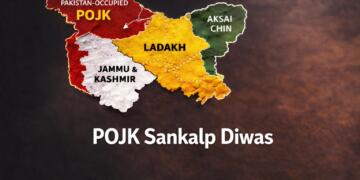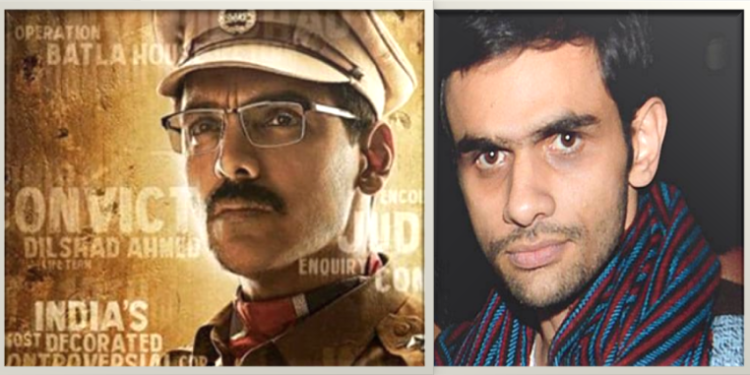A wise man once said, “The True hypocrite is the one who ceases to perceive his deception, the one who lies with sincerity.”
Such is the case with some of our Marxist intellectuals, who are extremely rattled by the unapologetic content as offered in the movie ‘Batla House’, directed by Nikhil Advani. The movie is based on the controversial ‘Batla House’ encounter that took place in 2008. It unceremoniously exposed the dirty nexus of the Marxist intelligentsia and the UPA government, who desperately wanted to prove the dreaded terrorists accused in this case as innocent and the entire encounter as fake, raising doubts on the intentions of the Delhi Police special cell, led by the then ACP Sanjeev Kumar Yadav.
Now surprisingly, but not unexpectedly, notorious member of the ‘Tukde Tukde Gang’ has accused the movie ‘Batla House’ of whitewashing the image of the ‘Delhi Police’. Umar has also expressed displeasure at the portrayal of the terror accused in the movie, pleading consistently for their innocence.
To quote an excerpt from Umar’s excuse of a review, “While claiming to be ‘inspired by true events’, the movie is simultaneously riddled with several disclaimers. One at the beginning states that the film ‘is inspired by the Delhi Police’ but it should not be presumed that it ‘accurately reflects those incidents that may have occurred.’
Contradiction, anyone?
That is precisely the point made by many – which the police version may not necessarily be true, and it is the role of the judiciary to establish facts. Let us figure out the anatomy of the film, and how many ‘cinematic’ liberties were taken with facts.”
Umar then goes to explain in ‘detail’ as to how the entire encounter was fake, and how the police has been concocting facts for all these years. To give an example of his propaganda, here’s another excerpt, “So, if the police is to be believed, two members of the IM module, who had the operational expertise to carry out multiple bombings, walked down just before their last strike to the police station to provide all their correct details and another walked up himself to a TV studio, making no effort to go into hiding even after the encounter.
The film, in a very cavalier manner, omits other facts around Nisar, which might put the police in a tight spot. As opposed to the police claim that Nisar had provided logistical support for the Ahmedabad and Delhi bombings, his family claimed, showing his admit card, that Nisar was giving his MBA exams in Delhi on 26 July — the day of the Ahmedabad blasts. How then could he be present at two different places simultaneously?”
Interestingly, while explaining the last couple of statements, Umar conveniently forgets that these were the same grounds on which the youngest accused of the Kathua case, i.e. Vishal Jangotra, pleaded innocence. At that time, the entire ‘Tukde Tukde Gang’ was hell bent on labeling him as the accused in the case and under no circumstances would they budge from their demands. Either they were lying then, or they were lying now. Doesn’t this come under the ambit of hypocrisy?
Furthermore, while claiming innocence for terrorist Dilshad Ahmad, sentence to life imprisonment for murdering Inspector Mohan Chand Sharma [Ashok Chakra], Umar Khalid goes on to raise a question only the likes of him are good at posing at. To quote the excerpt, “……..But these later arrests of individuals affiliated to Hindutva outfits were the result of meticulous investigations done under the supervision of slain inspector Hemant Karkare. Are the film makers trying to insinuate that while ACP Yadav was the ‘good cop’ who went after the dreaded Islamist radicals at much risk to his life and limb, the late Hemant Karkare was the ‘bad cop’ who was ‘balancing’ the narrative at the behest of the then UPA government?”
If someone has been exposed here, it is Umar Khalid himself, who is certainly rattled by the findings of the movie ‘Batla House’. The way he has tried to dismiss the findings of Delhi police as ‘absurd’ reeks of his immense contempt towards the law enforcement authorities of this country. Interestingly, the movie exposes the likes of such activists, who were insistent on proving the Delhi Police guilty for their own vested interests. Surely Umar wouldn’t like anything exposing his true identity, would he?
The same was observed when quasi liberal critics bashed ‘Parmanu’ left, right and center, just because the movie tended to glorify the achievements under the reign of Atal Bihari Vajpayee as the PM of India and APJ Abdul Kalam as one of the lead scientists of the Operation Shakti, which culminated in the nuclear blasts of 1998, which is till date one of the most successful covert operations conducted anywhere around the world.
Moreover, the question of this article being impartial went for a toss the moment Umar Khalid approached the Quint, a portal already notorious for their coverage of the Kulbhushan Jadhav case, ironically used by Pakistan in order to prove their case at the International Court of Justice. Moreover, as said by John’s character in the movie itself, the real danger to the minorities in India is from such custodians of their rights, who claim to fight for them, while pocketing all the grants and resources in the name.
They say that if someone is rattled by your work and tries their best to discredit it, you’re certainly doing a good job. Going by this Nikhil Advani and John Abraham have certainly done a brilliant job in exposing the nefarious motives of such quasi liberals, who only wish to see Indians as their slaves. Anything else is strictly uncalled for, going by the venomous criticism of Batla House by Umar Khalid.




























